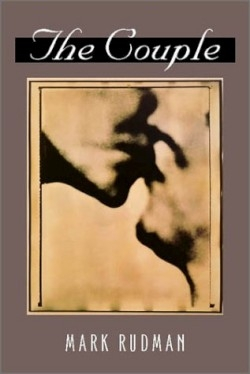The Couple
One senses a dimly lit bar and zealous English teacher
sitting amid his flock, making Perseus and Andromeda, Mary Ure and Robert Shaw as familiar as Pamela and Tommy Lee, and much more human. In this, Rudman’s fourth collection of poems, he expands the notion of the couple to include directors and actors, parents and children, elementary school kids, and mythical characters. He also re-envisions coupled ideasÃ’death of body and life on screen, the functional and the fantastic, the fact of the matter and the strange, more interesting facts of memory.
Rudman, a recipient of fellowships from the Guggenheim and the National Endowment of the Arts, can be discursive and detailed, advocating slow appreciation and poking fun at fast-food capitalism: “If you’re dying to know what those on earth / have done with all the clock time / their inventions have allowed them to save, / Midas, not Perseus, is the one to ask.” Clearly, too, there is humor; Andromeda considers the relative merits of painters; Orpheus and Perseus quibble over great writers.
In the midst of his myth madness comes Rudman’s movie madness. A true lover of film, he engages the tragic story of Mary Ure in an extended series of poems chronicling her life and her contemporaries. The resulting series of poems is compassionate and awestruck.
Rudman’s understanding is never solely academic. Through the course of the poems, little vignettes of his own interact with the story, weaving in a chronological coherence. Dean Martin and Jerry Lewis chase Rudman’s mother:
They didn’t break rules, they made them up
as they went along, as when they leapt from the stage
followed by floodlights in Fort Lee, New Jersey,
to chase a slender tall brunette in a white dress
down the aisle, chanting in imitation moronÃ’
Rudman takes his son to the movies and explains the nature of representation, “Since Sam’s fascination with the real and the fake / runs curiously parallel to my own.” This fascination pervades the book, making human the fictive, suggesting that the poet’s understanding of the real is generous, and firmly adhered to the notions of humanity and savoring over money and speed. For readers fascinated by myth, Greek, Californian and personal, Rudman is a creator of the casually epic.
Reviewed by
Camille-Yvette Welsch
Disclosure: This article is not an endorsement, but a review. The publisher of this book provided free copies of the book to have their book reviewed by a professional reviewer. No fee was paid by the publisher for this review. Foreword Reviews only recommends books that we love. Foreword Magazine, Inc. is disclosing this in accordance with the Federal Trade Commission’s 16 CFR, Part 255.

